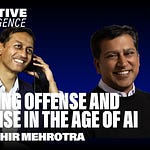“AI won’t replace you — but someone using AI will.”
It’s the most quoted line in the future-of-work playbook. But what if it’s wrong — or at least, dangerously incomplete?
I sat down with Sangeet Paul Choudary — author of the bestselling book Platform Revolution and the upcoming release Reshuffle — to unpack how AI isn’t just shifting individual tasks. It’s reshaping entire systems of work.
Sangeet makes an important point that the most quoted line about AI not taking our jobs is "seductive precisely because it feels empowering. It makes you feel like you’ve figured something out ... it gives you just enough conceptual clarity to stop asking the harder questions that really matter: How does AI change the structure of work? How does it restructure workflows?"
A few themes that stuck with me:
AI is Changing the System, Not Just the Tasks: Sangeet compares our current framing of AI’s impact to France’s misplaced faith in the Maginot Line during WWII. Just as France failed to anticipate Germany’s blitzkrieg (a new system of warfare), many today assume AI is just about replacing or augmenting existing tasks. But the real shift is at the system level: how organizations are structured, how competition works, and what creates value. (Timestamp: ~4:00 – 6:30)
Specialized Skills Becoming Generalist Capabilities: Sangeet reminds us that typists weren’t displaced by other typists using word processors; they were displaced because the system of work changed and their specialized skill became a generalist requirement with the advent of word processors. The same is now happening in coding, design, and more. (timestamp: ~20:10 – 24:30)
You Might Be Training AI to Replace You: If you're in consulting, law, or pharma and using 3rd-party AI tools without proprietary safeguards, you may be feeding sensitive industry knowledge into the very systems that will eventually automate your role. (Timestamp: ~35:50 – 36:35)
Follow the constraint: As AI commoditizes certain capabilities—answering questions, generating code, drafting content—the source of value shifts. He argues that instead of clinging to skills that are becoming abundant, we should identify where scarcity (and thus economic value) is emerging. (Timestamp: ~13:00 – 20:00)
Let me share my reflection on this last point. In my job as a business school professor, the constraint is no longer knowledge transfer. AI can handle that exceedingly well. The real value now lies in motivation, inspiration, and helping students understand why something matters and feel something for a subject. That shift—from being a transmitter of knowledge to a cultivator of curiosity—is how I now think of my job. To me, it is also a blueprint for many knowledge workers and “experts.” The value isn’t just in what you know, but in the emotional and motivational leverage you can create. You’re not just a source of answers—you’re a cultivator of meaningful inquiry. A curator and tastemaker.
Talking about curation and tastemaking, here’s a preview of my next episode. In Episode 5, I will be chatting with David Droga, current (and outgoing) CEO of Accenture Song. David is among the most well known names in advertising. We will discuss whether AI is the best creative partner for creative workers or a threat to them? We will also explore what will be the role for humans when AI can excel at creativity. And how creative jobs such as that of a CMO or a creative director will evolve with AI. That should be a fun discussion.
Timestamps
0:00 Introduction – AI Won’t Replace You? Rethinking the Premise
2:40 Systemic Change vs Task Replacement: How AI Reshapes Work
6:58 AI changes entire systems of work: Shipping Containers to Word Processors
13:36 Economic value depends on the constraint:: The case of vibe coding
18:17 Teaching, Knowledge, and Scarcity in the Age of AI
21:24 Power Shifts Across Industries
29:48 Structure, Strategy, and Survival
35:59 How to Personally Adapt
40:03 Takeaways – Follow the Constraints, Not Just the Tasks









